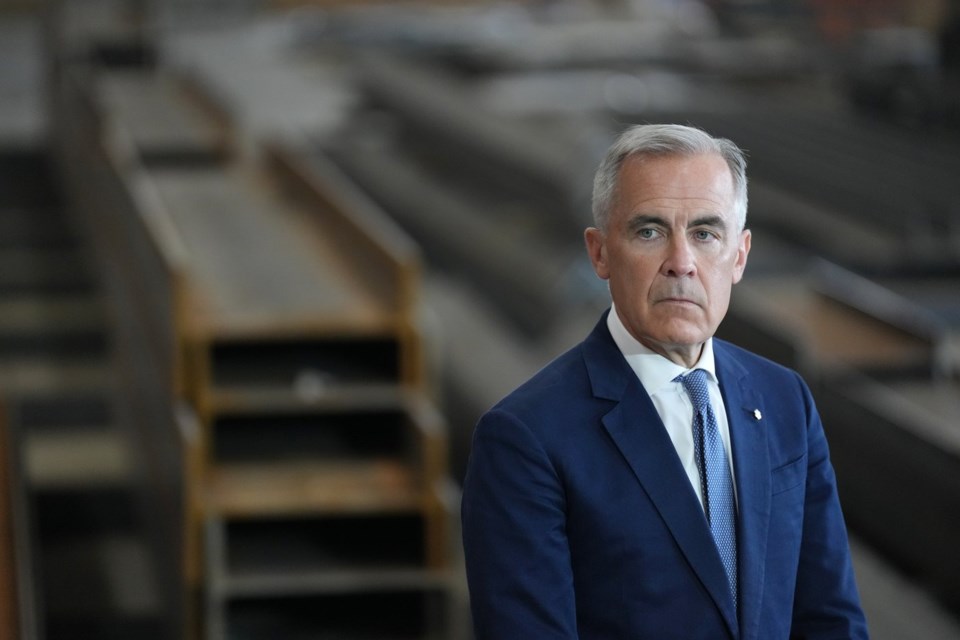OTTAWA — Steel originating in China will be subjected to higher tariffs to try and prevent steel dumping amid U.S. President Donald Trump's ongoing global trade war, Prime Minister Mark Carney said on Wednesday.
The prime minister toured a steel manufacturing company in Hamilton before announcing a suite of measures to protect the Canadian steel industry. The visit comes more than a month after Trump hiked tariffs on steel and aluminum to 50 per cent from 25, but for now Canada is still not adjusting its retaliatory tariffs on some U.S. steel and aluminum products that have been in place since the spring.
Wednesday's announcement included a new 25 per cent tariff on all steel products that contain metal melted and poured in China by the end of the month.
Carney also said the import quotas promised last month on foreign steel, excluding the U.S. and Mexico, will take effect by the end of July, with a 50 per cent tariff rate charged on imports above those quotas. Countries that don't have a free-trade agreement with Canada will have quotas set at 50 per cent of their exports to Canada in 2024, which would include China and India.
Countries that do have a free trade agreement will have their quota set at 100 per cent of their 2024 exports to Canada.
Carney said there is a global realignment of steel markets, in part due to Trump's trade war, and that Canada's steel industry will be among those most affected by the changes because it is one of the most open in the world for steel imports.
"Imports supply almost two-thirds of current Canadian consumption of steel, compared to less than one-third for the United States and less than one-sixth for the European Union," Carney said.
"Over time, we've become too dependent on the United States as our biggest customer with more than 90 per cent of our steel exports going south of the border," he added.
Industry Canada data shows more than $16 billion in steel imports in 2024, almost half of that from the U.S., and about 10 per cent from China. Canada exported more than $12 billion in steel, 91 per cent to the U.S., and four per cent to Mexico.
The prime minister said Canada must rely more on "Canadian steel, for Canadian projects."
Carney made the announcement at Walters Group in Hamilton, a structural steel manufacturer.
The company's executive vice-president Walt Koppelaar said that in the last few years 70 per cent of the company's product went to the U.S. and now almost none of it does because of Trump's 50 per cent steel tariffs.
"It's tough. We are focused on the Canadian market and we're going to do everything we can to get the folks busy here," Koppelaar said following Carney's announcement.
Carney said Canada is continuing to negotiate with the U.S. to get a new economic deal, but would reveal little detail of those negotiations on Wednesday.
"We will continue to work constructively for a deal, but it has to be a deal that works for Canadians and Canadian workers. And part of the reason why we don't have a deal is that deal is not yet on the table," he said.
Trump and Carney agreed in June at the G7 summit to try and reach a deal by July 21 but last week Trump moved that deadline to Aug. 1, telling Carney he intends to impose a 35 per cent across-the-board tariff on Canada that same day.
White House officials say this is likely to only apply to non-Canada-United States-Mexico Agreement compliant goods, which are already tariffed at 25 per cent. About 38 per cent of Canada's exports to the U.S. before the trade war started were covered by the CUSMA deal, though many more could receive an exemption if the companies involved applied for one.
Carney said that outside of steel, aluminum, automobiles and lumber the "vast, vast majority" of Canadian goods don't face U.S. tariffs unlike other countries that don't have agreements with the U.S. Trump is also planning to impose new duties on copper on Aug. 1 and has threatened massive tariffs on pharmaceuticals, though likely not until at least next year.
The prime minister added that Canada is trying to get an agreement on softwood lumber exports included in the negotiations with the U.S.
Before Carney's announcement, Bloc Québécois Leader Yves-François Blanchet said the Liberals have fumbled trade with the U.S., saying Canada has no gains to show for its concessions, such as boosting border and military spending while killing a tax on Big Tech firms.
"We're facing a disappointment, where Mr. Carney is not at all delivering the great negotiating prowess he had himself invoked to get elected," he said in French on Parliament Hill.
Blanchet suggested Carney has been too focused on passing his controversial major-projects legislation.
"He has not given the trade issue and the tariffs issue enough interest to get any kind of results so far," Blanchet told reporters in English. "He has renounced and made compromises on many things so far, without achieving anything in the (deadlines) he had himself created and announced."
Other supports for the steel sector include $70 million to provide employment insurance and retraining for up to 10,000 steelworkers, prioritizing Canadian steel in public projects and making it easier for steel companies to get low interest financing through the Large Enterprise Tariff Loan program.
— With files from Dylan Robertson in Ottawa and Maan Alhmidi in Hamilton.
This report by The Canadian Press was first published July 16, 2025.
David Baxter, The Canadian Press



